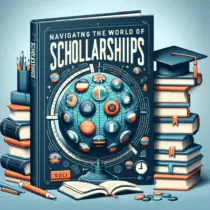Navigating the World of Scholarships: A Comprehensive Guide
Introduction:
Scholarships are a golden opportunity for students to pursue their dreams of higher education without the crushing burden of financial constraints. In today’s competitive world, scholarships provide a much-needed lifeline for those aspiring for academic excellence. However, with numerous scholarship options available, navigating through the maze can be quite overwhelming. This comprehensive guide aims to demystify the process and equip students with essential knowledge on how to find and win scholarships that will make their dreams come true.
Scholarship Provider:
The scholarship provider plays a crucial role in determining the worthiness and legitimacy of any scholarship opportunity. When embarking on your scholarship journey, it is important to thoroughly research and understand the organization or individual offering the scholarship. Reputable providers usually have firm ties with educational institutions, foundations, or government bodies.
Furthermore, it is imperative to consider the provider’s values and vision. Are they aligned with your personal goals? Do they prioritize specific fields of study or preference certain demographics? These factors are vital in determining whether you should invest your time and effort into applying for a particular scholarship.
Eligible Applicants:
Each scholarship has certain criteria that determine who can apply. Some scholarships are open to all students across diverse disciplines, while others may be specific to certain fields of study such as STEM (Science, Technology, Engineering, and Mathematics), humanities or arts. Apart from academic excellence, other factors like community involvement, leadership skills, or financial need may also be considered depending on the scholarship.
Host Country:
Many scholarships offer opportunities to study abroad in countries known for their renowned educational institutions. This provides students with an added advantage of experiencing different cultures while pursuing their academic goals. It is essential to research and understand the host country’s education system, culture, language requirements, and any other factors that may impact your experience there.
Scholarship Worth:
Scholarship worth varies significantly from one opportunity to another. Some scholarships may cover the entire cost of tuition, books, and living expenses, while others may only provide partial funding. Understanding the financial implications of each scholarship is crucial in planning your educational journey effectively. Take into consideration any additional perks or benefits that may accompany the scholarship, such as mentorship programs or internship opportunities.
Level and Field of Study:
Scholarships are available at various levels of education, ranging from undergraduate to postgraduate studies. Some scholarships may even support doctoral research or specialized professional degrees. Similarly, scholarships cater to a wide range of fields of study, including but not limited to engineering, medicine, business, social sciences, and creative arts. It is vital to match your intended field of study with the scholarship’s focus area to increase your chances of success.
How to apply for the “Navigating the World of Scholarships: A Comprehensive Guide”:

Applying for the “Navigating the World of Scholarships: A Comprehensive Guide” scholarship is easy and straightforward. Interested applicants should visit our website and complete the online application form provided. The form requires basic personal information along with academic credentials and any relevant extracurricular activities or achievements.
Once submitted, our selection committee will thoroughly review each application and shortlist candidates based on their merit and alignment with our scholarship’s objectives. Shortlisted applicants will proceed to an interview stage where they will have an opportunity to further demonstrate their potential as deserving scholars.
Countries that can apply:
The “Navigating the World of Scholarships: A Comprehensive Guide” scholarship is open to students from all countries worldwide. We believe in providing equal opportunities for individuals across borders who are dedicated to pursuing their educational dreams.
Eligibility Criteria:
To be eligible for the “Navigating the World of Scholarships: A Comprehensive Guide” scholarship, applicants must be currently enrolled in a recognized educational institution or have received admission into a recognized institution for higher studies within the next academic year. Demonstrated academic excellence, passion for learning, and a clear vision for utilizing the scholarship to achieve career aspirations are also important selection criteria.
Actual Scholarship Deadline:
The application deadline for the “Navigating the World of Scholarships: A Comprehensive Guide” scholarship is December 31st, 20XX. Late applications will not be considered, so it is essential to submit your completed application well in advance to avoid any last-minute technical glitches or delays.
FAQ:
1. Can I apply for multiple scholarships simultaneously?
Yes, you can apply for multiple scholarships as long as you meet the eligibility criteria and fulfill the application requirements for each scholarship.
2. How can I improve my chances of winning a scholarship?
To increase your chances of winning a scholarship, focus on showcasing your unique strengths, experiences, and goals in your application. Highlight any community involvement, leadership roles, or exceptional achievements that set you apart from other applicants.
3. Are scholarships only based on academic performance?
Scholarships take into account various factors beyond academic performance. While good grades are certainly important, scholarships also consider extracurricular activities, leadership skills, community engagement, financial need, and future potential.
4. Can scholarships be used for studying online or part-time programs?
Some scholarships may allow funding for online or part-time programs, while others may have restrictions on how the funds can be utilized. It is crucial to carefully read through the scholarship guidelines and confirm if they support your intended mode of study.
Conclusion:
Scholarships are an incredible opportunity that enables deserving students to pursue their dreams without being limited by financial barriers. By understanding the scholarship provider’s values, eligibility criteria, host country options, worth of the scholarship, and applying strategically with confidence and passion – students can navigate through this world of opportunities with ease and make their educational dreams a reality. Remember: knowledge is power when it comes to navigating the world of scholarships!








